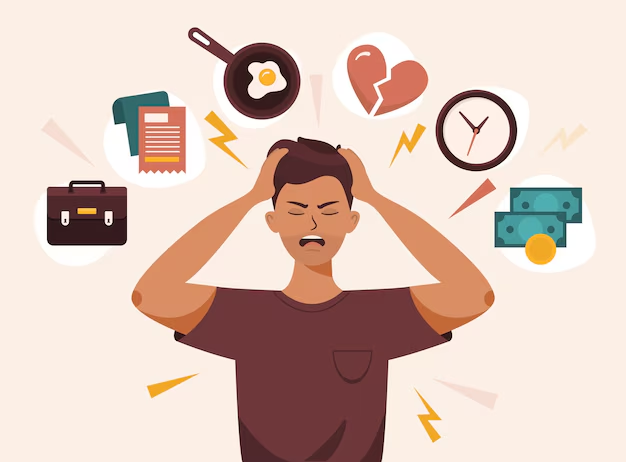Stress is an unavoidable part of life. While it serves a critical function in helping us respond to challenges, prolonged stress can affect the body in surprising ways. One significant concern that people often ask is, ‘does stress cause weight gain? Understanding this relationship is essential for managing stress and maintaining a healthy weight. Let’s explore how stress impacts the body and leads to changes in eating, metabolism, and physical activity.
Understanding Stress and Its Impact on the Body
Stress can manifest in various ways, but its effects on the body are universal. To grasp how stress contributes to weight gain, it’s vital to understand its mechanisms.
What Is Stress?
Stress is the body’s response to physical, emotional, or psychological challenges. It can be categorized into two types:
- Acute Stress: Short-term stress triggered by immediate situations, like narrowly avoiding a car accident.
- Chronic Stress: Long-term stress caused by prolonged situations, such as financial struggles or an unhealthy work environment.
While acute stress may sometimes be beneficial, chronic stress can wreak havoc on the body, including its ability to regulate weight.
The Stress Response Mechanism
When you encounter stress, your body activates a “fight or flight” response. This process involves the release of stress hormones like adrenaline and cortisol. These hormones prepare the body for action by:
- Increasing heart rate.
- Redirecting blood to essential organs.
- Mobilizing energy from stored glucose and fat.
While this response is life-saving in short bursts, prolonged activation due to chronic stress can disrupt normal bodily functions.
Introduction to Cortisol: The Stress Hormone
Cortisol plays a central role in the stress response. It helps regulate blood sugar, metabolism, and immune function. However, when cortisol levels remain elevated for long periods, it can lead to:
- Increased appetite.
- Greater fat storage, especially around the abdomen.
Understanding cortisol’s role is critical to managing stress-related weight gain.
Does Stress Cause Weight Gain?
Stress doesn’t just make you feel tense; it can significantly influence your eating habits, metabolism, and fat distribution.

How Stress Influences Eating Habits
When stressed, many people turn to food for comfort. This behavior, often called emotional eating, typically involves craving high-calorie, sugary, or fatty foods. According to Harvard Health, stress can alter the brain’s reward system, making these foods more appealing.
- Emotional eating often leads to overeating.
- Stress eating can contribute to poor dietary habits over time.
Cravings for “comfort foods” under stress are not just psychological; they are also driven by hormonal changes that encourage the consumption of energy-dense foods.
Cortisol and Fat Storage
Elevated cortisol levels can increase fat storage in the abdominal area. This is because cortisol:
- Stimulates fat cell growth.
- Encourages the body to prioritize storing fat around vital organs.
The Cleveland Clinic notes that this abdominal fat is not only cosmetically concerning but also associated with health risks like cardiovascular disease and type 2 diabetes.
Stress-Induced Metabolic Changes
Stress affects metabolism, reducing the number of calories the body burns at rest. Chronic stress can lead to:
- Lower energy expenditure.
- Difficulty losing weight despite efforts like diet and exercise.
These metabolic changes make weight management more challenging for people experiencing prolonged stress.
Related to Read: Does Exercise Lower Blood Sugar? A Comprehensive Guide
Psychological Factors Contributing to Weight Gain
Stress doesn’t only impact the body physically—it also alters behaviors and mental health, leading to weight gain.
Emotional Eating and Comfort Foods
Under stress, people often gravitate toward comfort foods that are high in sugar and fat. Harvard Health explains this behavior as a coping mechanism for negative emotions. While these foods provide temporary relief, they:
- Add unnecessary calories.
- Contribute to weight gain when consumed excessively.
Breaking the cycle of emotional eating requires addressing the root causes of stress and finding healthier coping mechanisms.
Stress-Induced Changes in Physical Activity
Stress can also reduce motivation to stay active. Many people feel fatigued or overwhelmed, making it difficult to maintain an exercise routine. Additionally:
- Chronic stress can lead to sedentary behaviors.
- Reduced activity further slows metabolism, compounding weight gain.
Creating time for physical activity, even in small amounts, can help counteract the effects of stress on weight.
Health Implications of Stress-Related Weight Gain
Stress doesn’t just affect your mental state—it has significant physical health implications. Prolonged stress and the resulting weight gain can lead to a cascade of health problems, affecting everything from your metabolism to your cardiovascular system. Let’s dive into the potential consequences and explore ways to manage stress effectively.
Increased Risk of Obesity
Stress has been strongly linked to obesity through both behavioral and physiological pathways. Chronic stress often triggers overeating, particularly of high-calorie foods, contributing to weight gain. According to Medical News Today, individuals under constant stress are more likely to have a higher Body Mass Index (BMI).
- Statistics: Studies show that people with chronic stress are up to 25% more likely to develop obesity than those with lower stress levels.
- Why It Happens: Elevated cortisol levels play a pivotal role, as they increase appetite and promote fat storage, particularly around the abdomen.
This makes managing stress a critical factor in reducing obesity risks and improving overall health.
Development of Metabolic Disorders
Weight gain driven by stress doesn’t stop at the scale—it increases the risk of metabolic disorders like diabetes, hypertension, and heart disease.
- Diabetes: Stress-induced eating can lead to spikes in blood sugar levels, increasing the risk of insulin resistance over time.
- Hypertension: Stress raises blood pressure through prolonged activation of the body’s stress response, compounding cardiovascular risks.
- Other Conditions: Stress-related abdominal fat is linked to inflammation, which further contributes to conditions like metabolic syndrome.
Addressing the root cause—stress—is vital to prevent these serious health complications.
Strategies to Manage Stress and Prevent Weight Gain
Managing stress effectively can break the cycle of stress-related weight gain. Here’s how to regain control of your health:

Stress Management Techniques
Reducing stress through mindfulness and relaxation practices can significantly improve your mental and physical health. Techniques include:
- Meditation: Helps calm the mind and regulate cortisol levels.
- Deep-Breathing Exercises: Slows the heart rate and reduces stress hormones.
- Journaling: Provides an emotional outlet to process stressful thoughts.
Incorporating these habits into your daily routine can lead to long-term stress relief.
Importance of Regular Physical Activity
Exercise isn’t just good for weight loss—it’s a powerful stress buster. When you exercise, your body releases endorphins, which improve mood and combat the negative effects of stress.
- How It Helps:
- Improves sleep quality.
- Increases energy levels.
- Helps burn calories and manage weight.
Even 30 minutes of moderate activity, like walking or cycling, can make a difference.
Adopting a Balanced Diet
Eating the right foods can help stabilize blood sugar levels and prevent stress-related overeating. Strategies include:
- Focus on Nutrient-Dense Foods: Incorporate fruits, vegetables, whole grains, and lean proteins.
- Avoid Trigger Foods: Limit processed foods high in sugar and fat.
- Stay Hydrated: Sometimes thirst is mistaken for hunger, leading to overeating.
Meal prepping and mindful eating are additional tools to maintain a balanced diet.
Seeking Professional Support
Sometimes, managing stress and weight gain requires expert intervention. Consider consulting:
- Therapists or Counselors: For managing emotional triggers.
- Dietitians: For personalized nutrition plans.
- Doctors: For identifying potential underlying health issues.
Support from healthcare professionals can make tackling stress and weight gain more manageable.
Related to Read: Is Fast Food Bad for Weight Loss? Healthy Alternatives
Conclusion
Stress and weight gain are closely linked, with prolonged stress leading to unhealthy eating habits, reduced physical activity, and changes in metabolism. This connection poses risks for obesity, diabetes, and other serious conditions.
The good news? Adopting stress management techniques, staying active, eating a balanced diet, and seeking professional support can help you take control of your health. Remember, small changes can lead to big improvements over time.
FAQs
1. Can stress-related weight gain be reversed?
Yes, stress-related weight gain can be reversed by managing stress effectively, adopting a balanced diet, and engaging in regular physical activity. Consistency is key to seeing long-term results.
2. How long does it take to see results from stress management?
The timeline varies depending on the individual, but many people start noticing reduced stress levels and improved health within a few weeks of practicing mindfulness, exercising, and eating well.
3. What are some quick ways to reduce stress during a busy day?
Try deep-breathing exercises, a five-minute meditation session, or a short walk. Even quick activities can help reset your mind and lower cortisol levels.
4. Are there specific foods that help reduce stress?
Yes, foods rich in magnesium (like spinach and almonds), omega-3 fatty acids (like salmon), and antioxidants (like berries) can help reduce stress and improve mood.
5. Should I avoid all snacks when stressed?
No, but choose healthier options like nuts, seeds, or fruits instead of processed snacks. Practicing mindful eating can also help you enjoy food without overindulging.

